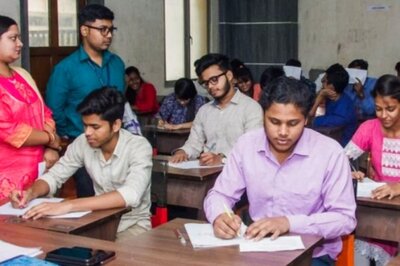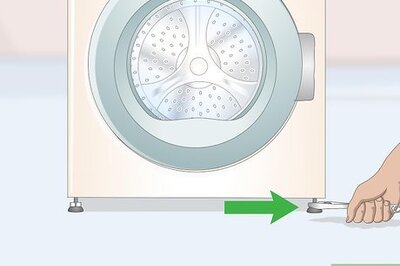
views
London: British cities began on Wednesday to clean up shopping streets littered with debris from a night of looting by gangs of hooded youths copying the tactics of young Londoners who had rampaged through districts of the capital for three nights.
London itself was largely quiet on Tuesday night, with some 16,000 police, 10,000 more than on Monday, sent onto the streets in a show of force in districts where gangs had looted shops and burned cars and buildings virtually unchecked on the previous three nights.
Prime Minister David Cameron, who cut short a family holiday in Italy to deal with the crisis, was due to chair a second meeting of COBRA, the government's crisis committee, and recalled parliament, a rare occurrence, to debate the violence.
The chaos in London, and fears of further disruption, led to the cancellation of an England-Netherlands soccer friendly on Wednesday and the postponement of three club matches.
The looting also showed the world an ugly side of London less than a year before it hosts the 2012 Olympic Games, an event official hope will serve as a showcase for the city.
A visit by an International Olympic Committee went ahead on Tuesday "as planned" and the London organisers of the Games said the violence would not hurt preparations for the Olympics.
While heavy policing in London prevented all but a few incidents in the capital, copycat looting and violence erupted in cities and towns to the north and west.
Groups of youths in hooded tops fought running battles with police in Manchester in northwest England, smashing windows and looting shops, and setting fire to a clothes shop.
In Salford, greater Manchester, rioters threw bricks at police and set fire to buildings. A BBC cameraman was attacked. Television pictures showed flames leaping from shops and cars, and plumes of thick black smoke billowing across roads.
"Greater Manchester Police has been faced with extraordinary levels of violence from groups of criminals’ intent on committing widespread disorder," Assistant Chief Constable Gary Shewan said.
"These people have nothing to protest against - there is no sense of injustice or any spark that has led to this. It is, pure and simple, acts of criminal behaviour which are the worst I have seen on this scale."
In Liverpool's Toxteth district, rioters attacked two fire engines and a fire officer's car, police said. Earlier, some 200 youths throwing missiles wrecked and looted shops, causing 'disorder and damage', police said.
Police said they had arrested 47 people in Manchester and Salford, and 37 in Toxteth.
In Gloucester, in western England, eight fire crews fought a blaze in a large derelict building, cars were set on fire and groups of youths attacked police with rocks and bottles.
Cars were burned and stores looted in West Bromwich and Wolverhampton, and in the Midlands town of Nottingham a gang of young men set fire to a police station. There were also disturbances in Birmingham and Leicester in the Midlands, and Milton Keynes north of London.
In London, commuters hurried home early on Tuesday, shops shut and many shopkeepers boarded their windows.
Gangs have ransacked stores, carting off clothes, shoes and electronic goods, torched cars, shops and homes, causing tens of millions of pounds of damage, and taunted the police.
Community leaders said the violence in London, the worst for decades in the multi-ethnic capital of 7.8 million, was rooted in growing disparities in wealth and opportunity, but many insisted that greed was the looters' only motive.
Prime Minister David Cameron told reporters: "This is criminality pure and simple and it has to be confronted and defeated."
"People should be in no doubt that we will do everything necessary to restore order to Britain's streets," he said after the first meeting of COBRA.
STRUGGLING ECONOMY
The unrest poses a new challenge to Cameron as Britain's economy struggles to grow while his government slashes public spending and raises taxes to cut a yawning budget deficit, moves some commentators say have aggravated the plight of young people in inner cities.
Police said they had arrested a total of 768 people, one as young as 11 in London since the looting began on Saturday, and had charged more than 100 suspects, mainly with burglary and public order offences.
The first riots broke out on Saturday in north London's Tottenham district, when a protest over the police shooting of a suspect two days earlier led to violence.
Police are likely to come under fresh pressure over that incident after a watchdog said on Tuesday there was no evidence that a handgun retrieved by police at the scene had been fired. Reports initially suggested Mark Duggan had shot at police before they shot and killed him.


















Comments
0 comment